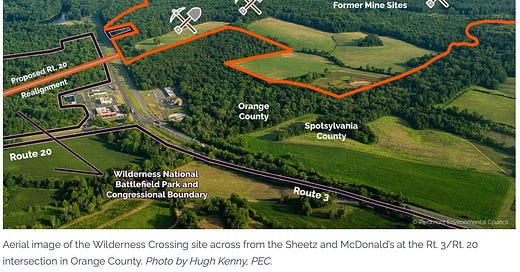Judge Franzén delays decision on Wilderness Crossing case
Orange County and American Battlefield Trust square off during four-hour hearing
The fate of the proposed 2,600-acre Wilderness Crossing development in eastern Orange County remains up in the air. On Friday afternoon (March 21), after a four-hour hearing in Orange County Circuit Court, Judge David B. Franzén said he needed more time before he could decide whether to dismiss a lawsuit brought against the Board of Supervisors and Orange County by American Battlefield Trust and other plaintiffs in the case. He said he will issue a written opinion when he’s reached his decision.
In his remarks at the close of the hearing, the judge said that Andrew McRoberts of Sands Anderson, representing the county and board of supervisors, and Mike Brady of Whiteford, Taylor and Preston LLP, representing the plaintiffs, both “believe it’s a clear-cut case. That’s what good attorneys do.” However, he said the matter before him is complicated and “will require extensive review and analysis by this court.” With “zero law clerks” to help him—an observation that drew a few chuckles—he said he would need considerable time to go through more than 2,000 pages of materials related to the hearing.
It will be two weeks before he and the attorneys can obtain a transcript of the hearing, and Franzén allotted two weeks to each side to submit a follow-up brief if they wish to. Either way, he said he would need at least 30 more days before issuing his decision. “I will be diligent in getting that opinion letter to you,” he promised. There will not be another hearing: He will either dismiss the case or allow it to proceed to trial.
Along with American Battlefield Trust, the plaintiffs include Central Virginia Battlefields Trust, Friends of the Wilderness Battlefield and landowners Mark and Cheryl Nowacki, and Robert Foster. In their bid to stop Wilderness Crossing, their lawsuit filed in May 2023 contends, in part, that the rezoning for the development to proceed is void because the county’s planned development-mixed use zoning ordinance was never properly created.
On Friday, Brady asked, “Did the governing body have the power to act as they did? Those questions of law come out our way.” McRoberts later countered that the governing body did have the power “and acted over a decade” to properly achieve its rezoning aims.
When the hearing began at 1:30 p.m., the courthouse gallery was mostly filled. A couple of hours later, about half the audience had left—it was Friday afternoon, after all. Orange County Administrator Ted Voorhees and District 3 Supervisor Keith Marshall, the only supervisor attending, stuck it out a while longer but exited before the judge adjourned the hearing shortly after 5:30 p.m.
Wilderness Crossing or Wilderness Crossed Out?
In April 2023, defying strong public opposition, Orange County supervisors approved rezoning of the Wilderness Crossing site from mostly agricultural to planned development-mixed use. The project promises to be the largest residential and commercial development in the county’s history, due to that rezoning decision.
Plans presented by the developer, KEG Associates III, LLC of Locust Grove, outline a labyrinth of houses, businesses, and towering data centers requiring huge amounts of electricity and water. The whole thing, bumping up against the Wilderness Battlefield and bringing a lot more traffic to the Route 3 corridor, is poised to take an astonishingly large bite out of the county’s beloved rural character.
According to “Struggle Against Mega-Development at Wilderness Battlefield Continues,” an article on the American Battlefield Trust website, the massive undertaking “could result in more than 5,000 residential units, 200,000 square feet of mixed-use commercial development, and 732 acres of data centers and distribution warehouses.”
If the County prevails and the case is dismissed, the bulldozers may not be headed toward the battlefield just yet, since the plaintiffs could appeal. And if Judge Franzén allows the case to proceed, expect an elaborate, high-stakes trial, with taxpayer dollars continuing to bankroll the defense.
For background on the Wilderness Crossing case, see the Aug. 13, 2024, issue of Byrd Street: Lawsuit keeps massive Wilderness Crossing project on hold. To read the lawsuit petition, click here. For the Wilderness Crossing design plan submitted to Orange County by KEG Associates III, click here.
Of related interest: The Orange County Board of Supervisors work session at 3 p.m. on Tuesday, March 25, will address proposed changes to the zoning ordinance.
PEC: Consider the “toxic legacy of gold mining” at Wilderness Crossing
Though not a plaintiff in the Wilderness Crossing case, the Piedmont Environmental Council strongly supports the lawsuit aiming to stop the development in its Bigfoot-sized tracks. PEC’s health and safety concerns warrant close consideration.
A page on the PEC website states, in part, “In addition to concerns about industrial development (data centers and distribution centers), taxes, infrastructure (water and sewer), traffic, and habitat fragmentation, Wilderness Crossing is also the site of numerous unreclaimed gold mines—essentially, mines that have never been closed off and cleaned up of contaminants such as mercury, arsenic, cadmium and lead. … PEC recommends that Orange County seriously consider how the toxic legacy of gold mining at this location could impact the health, safety and welfare of future residents and downstream communities.”
Chelsea Quintern resigns from Orange County School Board
There was a surprise announcement at the Orange County School Board’s meeting last Tuesday (March 18): Chelsea Quintern (District 4) had resigned.
Keep reading with a 7-day free trial
Subscribe to Byrd Street to keep reading this post and get 7 days of free access to the full post archives.



